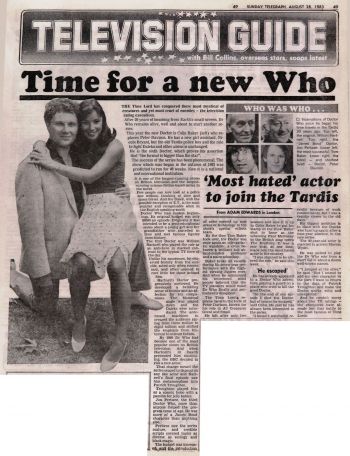Time for a new Who
- Publication: The Sunday Telegraph (Sydney, NSW)
- Date: 1983-08-28
- Author:
- Page:
- Language: English
THE Time Lord has conquered those most mystical of creatures and yet most cruel of enemies — the television rating executives.
After 20 years of beaming from Earth's small screen, Dr Who remains alive, well and about to start another series.
This year the new Doctor is Colin Baker (left) who replaces Peter Davison. He has a new girl assistant, Nicola Bryant, but the old Tardis police box and the role to fight Daleks and other aliens is unchanged.
He is the sixth Doctor, which proves his assertion that "the format is bigger than the star".
The success of the series has been phenomenal. The show which was began in the autumn of 1963 was predicted to run for 40 weeks. Now it is a national and international institution.
It is one of the longest-running shows on British television and the longest-running science-fiction-based series In the world.
Few people can now look at a police box without thinking of time and space travel. And the Dalek, with the possible exception of E.T., is the most popular and recognisable alien in the English speaking world.
Doctor Who had modest beginnings. Its original budget was only $4000 an episode. Originally it was intended to be a semi-educational series about a young girl and her grandfather who travelled in time and met famous figures from history.
The first Doctor was William Hartnell who played the role as an anti-hero in marked contrast to the typical TV hero of the day.
Unlike his successors, he observed history from the outside, acted only when neccessary, and often seemed to care little for those around him.
Hartnell's Doctor progressively mellowed. He developed a twinkling sense of humor and an affection for his companions. The historical angle was played down and the Daleks were introduced. The antennaed machines increased the audience rating from three million to eight million and shifted the emphasis from historical to science fiction.
By 1966 Dr Who had become one of the most popular shows on British television. And when Hartnell's ill health prevented him continuing, the BBC decided to risk a new actor.
That change meant the series ceased to depend on any one actor and Hartnell's final episode saw him metamorphose into Patrick Troughton.
Troughton played him as a cosmic hobo with a passion for jelly babies. Jon Pertwee, the third Doctor Who, more than anyone helped the program come of age. He was more of a James Bond character than anything else.
Pertwee saw the series mature, and credible scripts covered topics as diverse as ecology and black magic.
The budget was increased and the introduction of color opened up new areas of technology to the show's special effects team.
By the time Tom Baker took over, the Doctor was once again an intergallactic wanderer, a cross between a brilliant but absent-minded professor and a naive schoolboy.
Baker broke all records during his seven-year performance with the highest viewing figures ever. And when he announced his retirement most people believed that the TV planners would make Dr Who finally and permanently disappear.
The Time Lord's reprieve came in the form of Peter Davison, known for his role in All Creatures Great and Small.
He left after only two seasons and now it is up to Cohn Baker to put his stamp on the show. Baker shot to fame as the scheming Paul Merroney in the British soap opera The Brothers. It was a role that, at one time, made him the most hated actor in the country.
"I was stunned to be offered the role," he said this week.
'He escaped'
He has already appeared in a Doctor Who adventure, playing a guard on a plane who tried to kill the good Doctor.
"At the end of one episode I shot the Doctor. but of course he escaped." said Colin. He said he has always been interested in the series.
"I haven't watched it recently because of work commitments. but I was a regular viewer in the old days."
His biggest ambition is to clash with the Daleks who turn up again, after a four-year absence, in the new series.
The 40-year-old actor is married to actress Marion Wyatt.
He was picked to play the Dr Who role from a short list of about a dozen well-known names.
"I jumped at the offer," he said. But I intend to add my own character to the part. I want to return to the days of Patrick Troughton and make the Doctor quirky. witty and unexpected."
And he needn't worry about the TV ratings —the executives have already lost that battle to the most famous of Time Lords.
WHO WAS WHO
Incarnations of Doctor Who since he began his time travels in the Tardis 20 years ago: Top left, the original. William Hartnell. Top right. the "James Bond" Doctor, Jon Pertwee. Lower left, the most successful. Tom Baker. Lower right, the latest — and shortest lived — Doctor, Peter Davison.
Disclaimer: These citations are created on-the-fly using primitive parsing techniques. You should double-check all citations. Send feedback to whovian@cuttingsarchive.org
- APA 6th ed.: (1983-08-28). Time for a new Who. The Sunday Telegraph (Sydney, NSW) .
- MLA 7th ed.: "Time for a new Who." The Sunday Telegraph (Sydney, NSW) [add city] 1983-08-28. Print.
- Chicago 15th ed.: "Time for a new Who." The Sunday Telegraph (Sydney, NSW), edition, sec., 1983-08-28
- Turabian: "Time for a new Who." The Sunday Telegraph (Sydney, NSW), 1983-08-28, section, edition.
- Wikipedia (this article): <ref>{{cite news| title=Time for a new Who | url=http://cuttingsarchive.org/index.php/Time_for_a_new_Who | work=The Sunday Telegraph (Sydney, NSW) | pages= | date=1983-08-28 | via=Doctor Who Cuttings Archive | accessdate=17 May 2025 }}</ref>
- Wikipedia (this page): <ref>{{cite web | title=Time for a new Who | url=http://cuttingsarchive.org/index.php/Time_for_a_new_Who | work=Doctor Who Cuttings Archive | accessdate=17 May 2025}}</ref>
